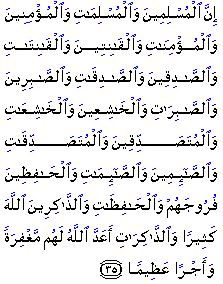Living The Quran
From Issue: 505 [Read full issue]
Al-Ahzab (The Confederates)
Chapter 33: Verse 35
 Equal Footing
Equal Footing
"For Muslim men and women, for believing men and women, for devout men and women, for true men and women, for men and women who are patient and constant, for men and women who humble themselves, for men and women who give in charity, for men and women who fast, for men and women who guard their chastity, and for men and women who engage much in Allah's praise, for them has Allah prepared forgiveness and great reward."
Initially, Quranic verses used only the masculine plural form to refer to the women and men in the new faith community. For years, "believers" (al-muminun), and "the truthful" (as-sadiqun), either referred specifically to men or to the men and women who constituted the Prophet's first Companions. Once, a woman (or several, according to the different traditions) asked the Prophet why women were not explicitly mentioned in the revealed message. The Book - which, while revealing a universal message, also included responses to the questions asked by the Men around the Prophet - was later to mention women and men distinctively, as in the above verse.
This evolution of the message is part of divine teaching in the process of revelation carried out over twenty-three years: the faithful are thus led to evolve in their understanding of things and critically reconsider some of their cultural or social practices. The status of women, who were sometimes killed at birth because of the shame they might bring, was to be reformed in stages, as verses were revealed.
It thus appeared more and more clearly that the Quran's message and the Prophet's attitude were apt to free women from the cultural shackles of Arab tribes and clans and from the practices of the time. The Creator addresses women as being on an equal footing with men, their status as beings and believers is the same as men's, and the requirements of worship are absolutely identical.
Compiled From:
"Radical Reform: Islamic Ethics and Liberation" - Tariq Ramadan, pp. 209, 210